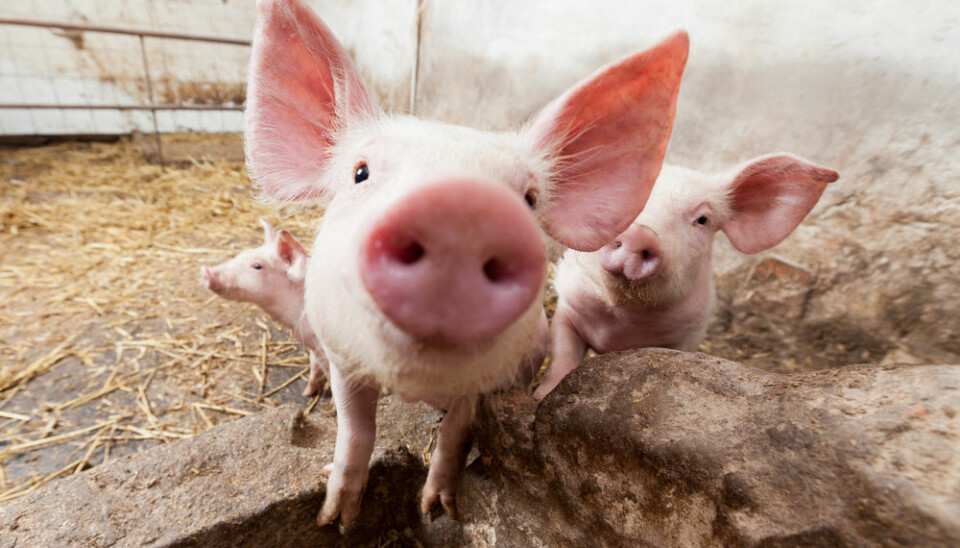
Fat makes pigs more social and less aggressive
A high-fat diet changes social behaviour, reveals new study. This should be considered when advising the public on nutrition, say researchers.
Most of us associate the words ‘fat’ and ‘cholesterol’ with overweight, cardiovascular disease and unhealthy lifestyles but we could all be wrong, according to researchers who argue that not even the infamous saturated fats are as bad as we think they are.
A new Danish study reveals that a diet high in fat and cholesterol makes pigs more social, less aggressive and less fearful. According to the researchers behind the study, such behaviour is associated with good health. The study was recently published in PLOS ONE.
Even though the study was done on pigs the results would most likely be applicable to humans as well, says Annika Maria Juul Haagensen, PhD in Veterinary Disease Biology at the University of Copenhagen, who authored the study.
“It’s definitely something we should consider,” she says. “The next step is to determine how much fat is optimal for our physical and psychological health."
Associate professor Lotte Lauritzen from the Department of Nutrition, Exercise and Sports at the University of Copenhagen says that’s a reasonable assumption.
“Previous studies on monkeys and rodents support these findings,” she says. “We know that our brain cells need fat to make new connections and function optimally.”
For instance, she says, too little omega 3 fat affects the serotonin system which regulates our mood.
Lauritzen wasn’t a part of the new study but she studies fatty acids and their significance to the body and health.
Sugar doesn’t increase aggression
The team of researchers from the University of Copenhagen examined how the behaviour of 24 pigs was influenced by their diet. The study began when the pigs were eight weeks old and ended when they were 21 weeks old.
-
The first group of pigs was given a normal diet: 6.8 per cent of the energy in the diet came from fat, 74.6 per cent from carbohydrates and 18.2 per cent from protein.
-
The second group was given the same diet, but with added sucrose. Sucrose is a type of sugar that’s composed of refined carbohydrates which make the body absorb energy faster.
- The third group of pigs were also given a standard diet but this time the proportion of fat was increased; 42 per cent of the energy came from fat, 46 per cent from carbohydrates and 12 per cent from protein.
Throughout the study the researchers took blood samples from the pigs and noted the number of scratches and bruises on their skin. They also observed the pigs’ behaviour towards one another as well as their curiosity.
The results showed that there was no apparent change in the behaviour of the first group and the second group. But the third group demonstrated more positive and social behaviour -- as well as less fear-related behaviour.
Fat helps the brain’s connections
It’s not just omega 3 acids that affect the release of serotonin. Previous research shows that a high cholesterol diet is associated with an increased release of serotonin -- which is exactly the sort of diet the pigs were given in the study, says Haagensen.
“There are several possible explanations to the changes in behaviour we observed in the pigs that were fed more fat,” she says.
One could be that the fat and cholesterol cause an increased release of serotonin. The higher levels of serotonin could’ve changed how aggressive, depressive and anxious the pigs were.
“At the same time a study shows that cholesterol increases the permeability between brain cells and blood. This means that more nutrients are transferred from the blood to the cells,” says Haagensen.
Healthy amount of fat still uncertain
Even though the researchers are testing three different diets on the pigs: low fat, low fat with added sugar and high fat -- they are still not able to say how much fat is sufficient, and how much is too little, says Lauritzen.
“This’ll require much more research where different amounts of fat in the diet is tested,” she says. “There’s most likely a difference between pigs and people when it comes to defining the optimal amount of fat. So more studies with people are needed.”
Aggression is a clever reaction
The increase in aggression could very well be caused by an innate instinct and a natural bodily reaction, says Lauritzen.
“Throughout our evolutionary history we’ve had to fight to get enough nutrients,” she says. “Those who managed best in that fight also performed best. So that’s why it makes good sense that our bodies react with increased aggression when nutrients are in short supply.”
The change in behaviour is meant to ensure that we get the nutrients that are vital to us, says Lauritzen.
---------------
Read the story in Danish on Videnskab.dk
Translated by: Iben Gøtzsche Thiele










